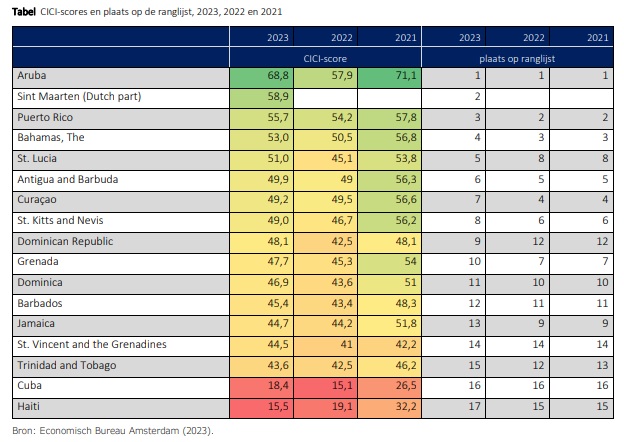St. Maarten second on investment climate index
PHILIPSBURG — St. Maarten is for the first time since its introduction in 2021 placed on the Caribbean Investment Climate Index, an initiative of the Economic Bureau Amsterdam. The index measures the investment climate in seventeen Caribbean countries and St. Maarten makes its first appearance in the second spot, behind index-leader Aruba.
The Economic Bureau Amsterdam previously did not have sufficient data to measure St. Maarten’s investment climate but it was now possible to assess the situation “because the availability of data has improved.”
Aruba is at the top of the list with 68.8 points, followed by St. Maarten with 58.9 points. Curacao is in seventh position with 49.2 points.
The index is based on eighteen institutional, economic and financial indicators. Examples of these indicators are rule of law, regulatory quality, openness of the economy, economic growth, interest and government debt.
“St. Maarten has the most open economy of the Caribbean region,” the report about the index states. This makes the country vulnerable to external economic shocks but it also makes the economy very resilient. The growth of St. Maarten’s economy is higher than the Caribbean average.
This also appears from the Economic Bulletin, published in June by the Central Bank of Curacao and St. Maarten. It mentions 9.8 percent growth in 2022, 3.2 percent in 2023 and 2.8 percent in 2024. In the years after that, growth will cool down a bit but the economy will still expand by 1.8 percent.
Latin America and the Caribbean are not performing as well as St. Maarten, with 4 percent growth in 2022, 1.5 percent in 2023 and 2.1 percent in 2024.
The population of St. Maarten is still growing and that results in “dynamics in the labor market and limited ageing,” the index-report states.
It further mentions that St. Maarten’s debt quote (a percentage of Gross Domestic Product) is “relatively low. According to Central Bank data this percentage was 39.4 in 2022 and it will decrease to 36.5 by 2027.
The index-creators consider the debt quote in a positive way: “It causes less repression of productive public investments and less uncertainty about future policy.”
The report states that St. Maarten should continue to put efforts into producing reliable data, because the availability of data is still low compared to other Caribbean countries.
Click here to download the report>>>
###
Related news: Consumer Price Index: life is becoming more expensive



























